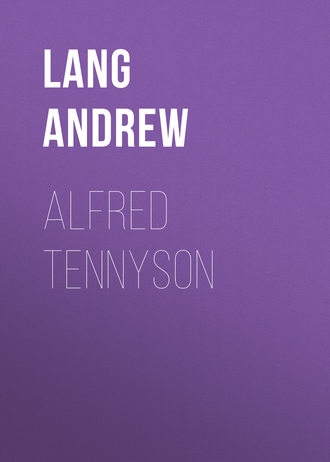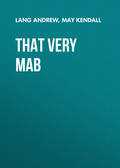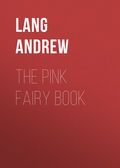
Lang Andrew
Alfred Tennyson
VI.
AFTER IN MEMORIAM
On June 13 Tennyson married, at Shiplake, the object of his old, long-tried, and constant affection. The marriage was still “imprudent,” – eight years of then uncontested supremacy in English poetry had not brought a golden harvest. Mr Moxon appears to have supplied £300 “in advance of royalties.” The sum, so contemptible in the eyes of first-rate modern novelists, was a competence to Tennyson, added to his little pension and the épaves of his patrimony. “The peace of God came into my life when I married her,” he said in later days. The poet made a charming copy of verses to his friend, the Rev. Mr Rawnsley, who tied the knot, as he and his bride drove to the beautiful village of Pangbourne. Thence they went to the stately Clevedon Court, the seat of Sir Abraham Elton, hard by the church where Arthur Hallam sleeps. The place is very ancient and beautiful, and was a favourite haunt of Thackeray. They passed on to Lynton, and to Glastonbury, where a collateral ancestor of Mrs Tennyson’s is buried beside King Arthur’s grave, in that green valley of Avilion, among the apple-blossoms. They settled for a while at Tent Lodge on Coniston Water, in a land of hospitable Marshalls.
After their return to London, on the night of November 18, Tennyson dreamed that Prince Albert came and kissed him, and that he himself said, “Very kind, but very German,” which was very like him. Next day he received from Windsor the offer of the Laureateship. He doubted, and hesitated, but accepted. Since Wordsworth’s death there had, as usual, been a good deal of banter about the probable new Laureate: examples of competitive odes exist in Bon Gaultier. That by Tennyson is Anacreontic, but he was not really set on kissing the Maids of Honour, as he is made to sing. Rogers had declined, on the plea of extreme old age; but it was worthy of the great and good Queen not to overlook the Nestor of English poets. For the rest, the Queen looked for “a name bearing such distinction in the literary world as to do credit to the appointment.” In the previous century the great poets had rarely been Laureates. But since Sir Walter Scott declined the bays in favour of Southey, for whom, again, the tale of bricks in the way of Odes was lightened, and when Wordsworth succeeded Southey, the office became honourable. Tennyson gave it an increase of renown, while, though in itself of merely nominal value, it served his poems, to speak profanely, as an advertisement. New editions of his books were at once in demand; while few readers had ever heard of Mr Browning, already his friend, and already author of Men and Women.
The Laureateship brought the poet acquainted with the Queen, who was to be his debtor in later days for encouragement and consolation. To his Laureateship we owe, among other good things, the stately and moving Ode on the Death of the Duke of Wellington, a splendid heroic piece, unappreciated at the moment. But Tennyson was, of course, no Birthday poet. Since the exile of the House of Stuart our kings in England have not maintained the old familiarity with many classes of their subjects. Literature has not been fashionable at Court, and Tennyson could in no age have been a courtier. We hear the complaint, every now and then, that official honours are not conferred (except the Laureateship) on men of letters. But most of them probably think it rather distinguished not to be decorated, or to carry titles borne by many deserving persons unvisited by the Muses. Even the appointment to the bays usually provokes a great deal of jealous and spiteful feeling, which would only be multiplied if official honours were distributed among men of the pen. Perhaps Tennyson’s laurels were not for nothing in the chorus of dispraise which greeted the Ode on the Duke of Wellington, and Maud.
The year 1851 was chiefly notable for a tour to Italy, made immortal in the beautiful poem of The Daisy, in a measure of the poet’s own invention. The next year, following on the Coup d’état and the rise of the new French empire, produced patriotic appeals to Britons to “guard their own,” which to a great extent former alien owners had been unsuccessful in guarding from Britons. The Tennysons had lost their first child at his birth: perhaps he is remembered in The Grandmother, “the babe had fought for his life.” In August 1852 the present Lord Tennyson was born, and Mr Maurice was asked to be godfather. The Wellington Ode was of November, and was met by “the almost universal depreciation of the press,” – why, except because, as I have just suggested, Tennyson was Laureate, it is impossible to imagine. The verses were worthy of the occasion: more they could not be.
In the autumn of 1853 the poet visited Ardtornish on the Sound of Mull, a beautiful place endeared to him who now writes by the earliest associations. It chanced to him to pass his holidays there just when Tennyson and Mr Palgrave had left – “Mr Tinsmith and Mr Pancake,” as Robert the boatman, a very black Celt, called them. Being then nine years of age, I heard of a poet’s visit, and asked, “A real poet, like Sir Walter Scott?” with whom I then supposed that “the Muse had gone away.” “Oh, not like Sir Walter Scott, of course,” my mother told me, with loyalty unashamed. One can think of the poet as Mrs Sellar, his hostess, describes him, beneath the limes of the avenue at Acharn, planted, Mrs Sellar says, by a cousin of Flora Macdonald. I have been told that the lady who planted the lilies, if not the limes, was the famed Jacobite, Miss Jennie Cameron, mentioned in Tom Jones. An English engraving of 1746 shows the Prince between these two beauties, Flora and Jennie.
“No one,” says Mrs Sellar, “could have been more easy, simple, and delightful,” and indeed it is no marvel that in her society and that of her husband, the Greek professor, and her cousin, Miss Cross, and in such scenes, “he blossomed out in the most genial manner, making us all feel as if he were an old friend.”
In November Tennyson took a house at Farringford, “as it was beautiful and far from the haunts of men.” There he settled to a country existence in the society of his wife, his two children (the second, Lionel, being in 1854 the baby), and there he composed Maud, while the sound of the guns, in practice for the war of the Crimea, boomed from the coast. In May Tennyson saw the artists, of schools oddly various, who illustrated his poems. Millais, Rossetti, and Holman Hunt gave the tone to the art, but Mr Horsley, Creswick, and Mulgrave were also engaged. While Maud was being composed Tennyson wrote The Charge of the Light Brigade; a famous poem, not in a manner in which he was born to excel – at least in my poor opinion. “Some one had blundered,” and that line was the first fashioned and the keynote of the poem; but, after all, “blundered” is not an exquisite rhyme to “hundred.” The poem, in any case, was most welcome to our army in the Crimea, and is a spirited piece for recitation.
In January 1855 Maud was finished; in April the poet copied it out for the press, and refreshed himself by reading a very different poem, The Lady of the Lake. The author, Sir Walter, had suffered, like the hero of Maud, by an unhappy love affair, which just faintly colours The Lady of the Lake by a single allusion, in the description of Fitz-James’s dreams: —
“Then, – from my couch may heavenly might
Chase that worst phantom of the night! —
Again returned the scenes of youth,
Of confident undoubting truth;
Again his soul he interchanged
With friends whose hearts were long estranged.
They come, in dim procession led,
The cold, the faithless, and the dead;
As warm each hand, each brow as gay,
As if they parted yesterday.
And doubt distracts him at the view —
Oh, were his senses false or true?
Dreamed he of death, or broken vow,
Or is it all a vision now?”
We learn from Lady Louisa Stuart, to whom Scott read these lines, that they referred to his lost love. I cite the passage because the extreme reticence of Scott, in his undying sorrow, is in contrast with what Tennyson, after reading The Lady of the Lake, was putting into the mouth of his complaining lover in Maud.
We have no reason to suppose that Tennyson himself had ever to bewail a faithless love. To be sure, the hero of Locksley Hall is in this attitude, but then Locksley Hall is not autobiographical. Less dramatic and impersonal in appearance are the stanzas —
“Come not, when I am dead,
To drop thy foolish tears upon my grave;”
and
“Child, if it were thine error or thy crime
I care no longer, being all unblest.”
No biographer tells us whether this was a personal complaint or a mere set of verses on an imaginary occasion. In In Memoriam Tennyson speaks out concerning the loss of a friend. In Maud, as in Locksley Hall, he makes his hero reveal the agony caused by the loss of a mistress. There is no reason to suppose that the poet had ever any such mischance, but many readers have taken Locksley Hall and Maud for autobiographical revelations, like In Memoriam. They are, on the other hand, imaginative and dramatic. They illustrate the pangs of disappointed love of woman, pangs more complex and more rankling than those inflicted by death. In each case, however, the poet, who has sung so nobly the happiness of fortunate wedded loves, has chosen a hero with whom we do not readily sympathise – a Hamlet in miniature,
“With a heart of furious fancies,”
as in the old mad song. This choice, thanks to the popular misconception, did him some harm. As a “monodramatic Idyll,” a romance in many rich lyric measures, Maud was at first excessively unpopular. “Tennyson’s Maud is Tennyson’s Maudlin,” said a satirist, and “morbid,” “mad,” “rampant,” and “rabid bloodthirstiness of soul,” were among the amenities of criticism. Tennyson hated war, but his hero, at least, hopes that national union in a national struggle will awake a nobler than the commercial spirit. Into the rights and wrongs of our quarrel with Russia we are not to go. Tennyson, rightly or wrongly, took the part of his country, and must “thole the feud” of those high-souled citizens who think their country always in the wrong – as perhaps it very frequently is. We are not to expect a tranquil absence of bias in the midst of military excitement, when very laudable sentiments are apt to misguide men in both directions. In any case, political partisanship added to the enemies of the poem, which was applauded by Henry Taylor, Ruskin, George Brimley, and Jowett, while Mrs Browning sent consoling words from Italy. The poem remained a favourite with the author, who chose passages from it often, when persuaded to read aloud by friends; and modern criticism has not failed to applaud the splendour of the verse and the subtlety of the mad scenes, the passion of the love lyrics.
These merits have ceased to be disputed, but, though a loyal Tennysonian, I have never quite been able to reconcile myself to Maud as a whole. The hero is an unwholesome young man, and not of an original kind. He is un beau ténébreux of 1830. I suppose it has been observed that he is merely The Master of Ravenswood in modern costume, and without Lady Ashton. Her part is taken by Maud’s brother. The situations of the hero and of the Master (whose acquaintance Thackeray never renewed after he lost his hat in the Kelpie Flow) are nearly identical. The families and fathers of both have been ruined by “the gray old wolf,” and by Sir William Ashton, representing the house of Stair. Both heroes live dawdling on, hard by their lost ancestral homes. Both fall in love with the daughters of the enemies of their houses. The loves of both are baffled, and end in tragedy. Both are concerned in a duel, though the Master, on his way to the ground, “stables his steed in the Kelpie Flow,” and the wooer in Maud shoots Lucy Ashton’s brother, – I mean the brother of Maud, – though duelling in England was out of date. Then comes an interval of madness, and he recovers amid the patriotic emotions of the ill-fated Crimean expedition. Both lovers are gloomy, though the Master has better cause, for the Tennysonian hero is more comfortably provided for than Edgar with his “man and maid,” his Caleb and Mysie. Finally, both The Bride of Lammermoor, which affected Tennyson so potently in boyhood
(“A merry merry bridal
A merry merry day”),
, and Maud, excel in passages rather than as wholes.
The hero of Maud, with his clandestine wooing of a girl of sixteen, has this apology, that the match had been, as it were, predestined, and desired by the mother of the lady. Still, the brother did not ill to be angry; and the peevishness of the hero against the brother and the parvenu lord and rival strikes a jarring note. In England, at least, the general sentiment is opposed to this moody, introspective kind of young man, of whom Tennyson is not to be supposed to approve. We do not feel certain that his man and maid were “ever ready to slander and steal.” That seems to be part of his jaundiced way of looking at everything and everybody. He has even a bad word for the “man-god” of modern days, —
“The man of science himself is fonder of glory, and vain,
An eye well-practised in nature, a spirit bounded and poor.”
Rien n’est sacré for this cynic, who thinks himself a Stoic. Thus Maud was made to be unpopular with the author’s countrymen, who conceived a prejudice against Maud’s lover, described by Tennyson as “a morbid poetic soul… an egotist with the makings of a cynic.” That he is “raised to sanity” (still in Tennyson’s words) “by a pure and holy love which elevates his whole nature,” the world failed to perceive, especially as the sanity was only a brief lucid interval, tempered by hanging about the garden to meet a girl of sixteen, unknown to her relations. Tennyson added that “different phases of passion in one person take the place of different characters,” to which critics replied that they wanted different characters, if only by way of relief, and did not care for any of the phases of passion. The learned Monsieur Janet has maintained that love is a disease like another, and that nobody falls in love when in perfect health of mind and body. This theory seems open to exception, but the hero of Maud is unhealthy enough. At best and last, he only helps to give a martial force a “send-off”: —
“I stood on a giant deck and mixed my breath
With a loyal people shouting a battle-cry.”
He did not go out as a volunteer, and probably the Crimean winters brought him back to his original estate of cynical gloom – and very naturally.
The reconciliation with Life is not like the reconciliation of In Memoriam. The poem took its rise in old lines, and most beautiful lines, which Tennyson had contributed in 1837 to a miscellany: —
“O that ’twere possible,
After long grief and pain,
To find the arms of my true love
Round me once again.”
Thence the poet, working back to find the origin of the situation, encountered the ideas and the persons of Maud.
I have tried to state the sources, in the general mind, of the general dislike of Maud. The public, “driving at practice,” disapproved of the “criticism of life” in the poem; confused the suffering narrator with the author, and neglected the poetry. “No modern poem,” said Jowett, “contains more lines that ring in the ears of men. I do not know any verse out of Shakespeare in which the ecstacy of love soars to such a height.” With these comments we may agree, yet may fail to follow Jowett when he says, “No poem since Shakespeare seems to show equal power of the same kind, or equal knowledge of human nature.” Shakespeare could not in a narrative poem have preferred the varying passions of one character to the characters of many persons.
Tennyson was “nettled at first,” his son says, “by these captious remarks of the ‘indolent reviewers,’ but afterwards he would take no notice of them except to speak of them in a half-pitiful, half-humorous, half-mournful manner.” The besetting sin and error of the critics was, of course, to confound Tennyson’s hero with himself, as if we confused Dickens with Pip.
Like Aurora Leigh, Lucile, and other works, Maud is under the disadvantage of being, practically, a novel of modern life in verse. Criticised as a tale of modern life (and it was criticised in that character), it could not be very highly esteemed. But the essence of Maud, of course, lies in the poetical vehicle. Nobody can cavil at the impressiveness of the opening stanzas —
“I hate the dreadful hollow behind the little wood”;
with the keynotes of colour and of desolation struck; the lips of the hollow “dabbled with blood-red heath,” the “red-ribb’d ledges,” and “the flying gold of the ruin’d woodlands”; and the contrast in the picture of the child Maud —
“Maud the delight of the village, the ringing joy of the Hall.”
The poem abounds in lines which live in the memory, as in the vernal description —
“A million emeralds break from the ruby-budded lime”;
and the voice heard in the garden singing
“A passionate ballad gallant and gay,”
as Lovelace’s Althea, and the lines on the far-off waving of a white hand, “betwixt the cloud and the moon.” The lyric of
“Birds in the high Hall-garden
When twilight was falling,
Maud, Maud, Maud, Maud,
They were crying and calling,”
was a favourite of the poet.
“What birds were these?” he is said to have asked a lady suddenly, when reading to a silent company.
“Nightingales,” suggested a listener, who did not probably remember any other fowl that is vocal in the dusk.
“No, they were rooks,” answered the poet.
“Come into the Garden, Maud,” is as fine a love-song as Tennyson ever wrote, with a triumphant ring, and a soaring exultant note. Then the poem drops from its height, like a lark shot high in heaven; tragedy comes, and remorse, and the beautiful interlude of the
“lovely shell,
Small and pure as a pearl.”
Then follows the exquisite
“O that ’twere possible,”
and the dull consciousness of the poem of madness, with its dumb gnawing confusion of pain and wandering memory; the hero being finally left, in the author’s words, “sane but shattered.”
Tennyson’s letters of the time show that the critics succeeded in wounding him: it was not a difficult thing to do. Maud was threatened with a broadside from “that pompholygous, broad-blown Apollodorus, the gifted X.” People who have read Aytoun’s diverting Firmilian, where Apollodorus plays his part, and who remember “gifted Gilfillan” in Waverley, know who the gifted X. was. But X. was no great authority south of Tay.
Despite the almost unanimous condemnation by public critics, the success of Maud enabled Tennyson to buy Farringford, so he must have been better appreciated and understood by the world than by the reviewers.
In February 1850 Tennyson returned to his old Arthurian themes, “the only big thing not done,” for Milton had merely glanced at Arthur, Dryden did not
“Raise the Table Round again,”
and Blackmore has never been reckoned adequate. Vivien was first composed as Merlin and Nimue, and then Geraint and Enid was adapted from the Mabinogion, the Welsh collection of Märchen and legends, things of widely different ages, now rather Celtic, or Brythonic, now amplifications made under the influence of mediæval French romance. Enid was finished in Wales in August, and Tennyson learned Welsh enough to be able to read the Mabinogion, which is much more of Welsh than many Arthurian critics possess. The two first Idylls were privately printed in the summer of 1857, being very rare and much desired of collectors in this embryonic shape. In July Guinevere was begun, in the middle, with Arthur’s valedictory address to his erring consort. In autumn Tennyson visited the late Duke of Argyll at Inveraray: he was much attached to the Duke – unlike Professor Huxley. Their love of nature, the Duke being as keen-eyed as the poet was short-sighted, was one tie of union. The Indian Mutiny, or at least the death of Havelock, was the occasion of lines which the author was too wise to include in any of his volumes: the poem on Lucknow was of later composition.
Guinevere was completed in March 1858; and Tennyson met Mr Swinburne, then very young. “What I particularly admired in him was that he did not press upon me any verses of his own.” Tennyson would have found more to admire if he had pressed for a sight of the verses. Neither he nor Mr Matthew Arnold was very encouraging to young poets: they had no sons in Apollo, like Ben Jonson. But both were kept in a perpetual state of apprehension by the army of versifiers who send volumes by post, to whom that can only be said what Tennyson did say to one of them, “As an amusement to yourself and your friends, the writing it” (verse) “is all very well.” It is the friends who do not find it amusing, while the stranger becomes the foe. The psychology of these pests of the Muses is bewildering. They do not seem to read poetry, only to write it and launch it at unoffending strangers. If they bought each other’s books, all of them could afford to publish.
The Master of Balliol, the most adviceful man, if one may use the term, of his age, appears to have advised Tennyson to publish the Idylls at once. There had been years of silence since Maud, and the Master suspected that “mosquitoes” (reviewers) were the cause. “There is a note needed to show the good side of human nature and to condone its frailties which Thackeray will never strike.” To others it seems that Thackeray was eternally striking this note: at that time in General Lambert, his wife, and daughters, not to speak of other characters in The Virginians. Who does not condone the frailties of Captain Costigan, and F. B., and the Chevalier Strong? In any case, Tennyson took his own time, he was (1858) only beginning Elaine. There is no doubt that Tennyson was easily pricked by unsympathetic criticism, even from the most insignificant source, and, as he confessed, he received little pleasure from praise. All authors, without exception, are sensitive. A sturdier author wrote that he would sometimes have been glad to meet his assailant “where the muir-cock was bailie.” We know how testily Wordsworth replied in defence to the gentlest comments by Lamb.
The Master of Balliol kept insisting, “As to the critics, their power is not really great… One drop of natural feeling in poetry or the true statement of a single new fact is already felt to be of more value than all the critics put together.” Yet even critics may be in the right, and of all great poets, Tennyson listened most obediently to their censures, as we have seen in the case of his early poems. His prolonged silences after the attacks of 1833 and 1855 were occupied in work and reflection: Achilles was not merely sulking in his tent, as some of his friends seem to have supposed. An epic in a series of epic idylls cannot be dashed off like a romantic novel in rhyme; and Tennyson’s method was always one of waiting for maturity of conception and execution.
Mrs Tennyson, doubtless by her lord’s desire, asked the Master (then tutor of Balliol) to suggest themes. Old age was suggested, and is treated in The Grandmother. Other topics were not handled. “I hold most strongly,” said the Master, “that it is the duty of every one who has the good fortune to know a man of genius to do any trifling service they can to lighten his work.” To do every service in his power to every man was the Master’s life-long practice. He was not much at home, his letters show, with Burns, to whom he seems to have attributed John Anderson, my jo, John, while he tells an anecdote of Burns composing Tam o’ Shanter with emotional tears, which, if true at all, is true of the making of To Mary in Heaven. If Burns wept over Tam o’ Shanter, the tears must have been tears of laughter.
The first four Idylls of the King were prepared for publication in the spring of 1859; while Tennyson was at work also on Pelleas and Ettarre, and the Tristram cycle. In autumn he went on a tour to Lisbon with Mr F. T. Palgrave and Mr Craufurd Grove. Returning, he fell eagerly to reading an early copy of Darwin’s Origin of Species, the crown of his own early speculations on the theory of evolution. “Your theory does not make against Christianity?” he asked Darwin later (1868), who replied, “No, certainly not.” But Darwin has stated the waverings of his own mind in contact with a topic too high for a priori reasoning, and only to be approached, if at all, on the strength of the scientific method applied to facts which science, so far, neglects, or denies, or “explains away,” rather than explains.
The Idylls, unlike Maud, were well received by the press, better by the public, and best of all by friends like Thackeray, the Duke of Argyll, the Master of Balliol, and Clough, while Ruskin showed some reserve. The letter from Thackeray I cannot deny myself the pleasure of citing from the Biography: it was written “in an ardour of claret and gratitude,” but posted some six weeks later: —
Folkestone, September.36 Onslow Square, October.
My dear old Alfred, – I owe you a letter of happiness and thanks. Sir, about three weeks ago, when I was ill in bed, I read the Idylls of the King, and I thought, “Oh, I must write to him now, for this pleasure, this delight, this splendour of happiness which I have been enjoying.” But I should have blotted the sheets, ’tis ill writing on one’s back. The letter full of gratitude never went as far as the post-office, and how comes it now?
D’abord, a bottle of claret. (The landlord of the hotel asked me down to the cellar and treated me.) Then afterwards sitting here, an old magazine, Fraser’s Magazine, 1850, and I come on a poem out of The Princess which says, “I hear the horns of Elfland blowing, blowing,” – no, it’s “the horns of Elfland faintly blowing” (I have been into my bedroom to fetch my pen and it has made that blot), and, reading the lines, which only one man in the world could write, I thought about the other horns of Elfland blowing in full strength, and Arthur in gold armour, and Guinevere in gold hair, and all those knights and heroes and beauties and purple landscapes and misty gray lakes in which you have made me live. They seem like facts to me, since about three weeks ago (three weeks or a month was it?) when I read the book. It is on the table yonder, and I don’t like, somehow, to disturb it, but the delight and gratitude! You have made me as happy as I was as a child with the Arabian Nights, – every step I have walked in Elfland has been a sort of Paradise to me. (The landlord gave two bottles of his claret and I think I drank the most) and here I have been lying back in the chair and thinking of those delightful Idylls, my thoughts being turned to you: what could I do but be grateful to that surprising genius which has made me so happy? Do you understand that what I mean is all true, and that I should break out were you sitting opposite with a pipe in your mouth? Gold and purple and diamonds, I say, gentlemen, and glory and love and honour, and if you haven’t given me all these why should I be in such an ardour of gratitude? But I have had out of that dear book the greatest delight that has ever come to me since I was a young man; to write and think about it makes me almost young, and this I suppose is what I’m doing, like an after-dinner speech.
P.S.– I thought the “Grandmother” quite as fine. How can you at 50 be doing things as well as at 35?
October 16th. – (I should think six weeks after the writing of the above.)
The rhapsody of gratitude was never sent, and for a peculiar reason: just about the time of writing I came to an arrangement with Smith & Elder to edit their new magazine, and to have a contribution from T. was the publishers’ and editor’s highest ambition. But to ask a man for a favour, and to praise and bow down before him in the same page, seemed to be so like hypocrisy, that I held my hand, and left this note in my desk, where it has been lying during a little French-Italian-Swiss tour which my girls and their papa have been making.
Meanwhile S. E. & Co. have been making their own proposals to you, and you have replied not favourably, I am sorry to hear; but now there is no reason why you should not have my homages, and I am just as thankful for the Idylls, and love and admire them just as much, as I did two months ago when I began to write in that ardour of claret and gratitude. If you can’t write for us you can’t. If you can by chance some day, and help an old friend, how pleased and happy I shall be! This however must be left to fate and your convenience: I don’t intend to give up hope, but accept the good fortune if it comes. I see one, two, three quarterlies advertised to-day, as all bringing laurels to laureatus. He will not refuse the private tribute of an old friend, will he? You don’t know how pleased the girls were at Kensington t’other day to hear you quote their father’s little verses, and he too I daresay was not disgusted. He sends you and yours his very best regards in this most heartfelt and artless
(note of admiration)!Always yours, my dear Alfred,W. M. Thackeray.
Naturally this letter gave Tennyson more pleasure than all the converted critics with their favourable reviews. The Duke of Argyll announced the conversion of Macaulay. The Master found Elaine “the fairest, sweetest, purest love poem in the English language.” As to the whole, “The allegory in the distance greatly strengthens, also elevates, the meaning of the poem.”
Ruskin, like some other critics, felt “the art and finish in these poems a little more than I like to feel it.” Yet Guinevere and Elaine had been rapidly written and little corrected. I confess to the opinion that what a man does most easily is, as a rule, what he does best. We know that the “art and finish” of Shakespeare were spontaneous, and so were those of Tennyson. Perfection in art is sometimes more sudden than we think, but then “the long preparation for it, – that unseen germination, that is what we ignore and forget.” But he wisely kept his pieces by him for a long time, restudying them with a fresh eye. The “unreality” of the subject also failed to please Ruskin, as it is a stumbling-block to others. He wanted poems on “the living present,” a theme not selected by Homer, Shakespeare, Spenser, Milton, Virgil, or the Greek dramatists, except (among surviving plays) in the Persæ of Æschylus. The poet who can transfigure the hot present is fortunate, but most, and the greatest, have visited the cool quiet purlieus of the past.







